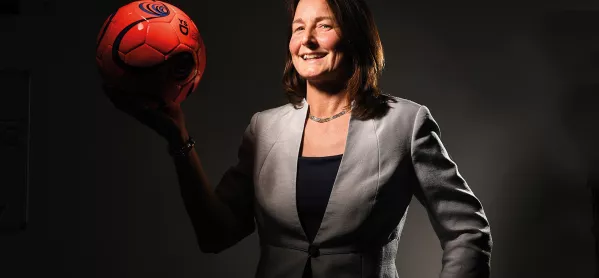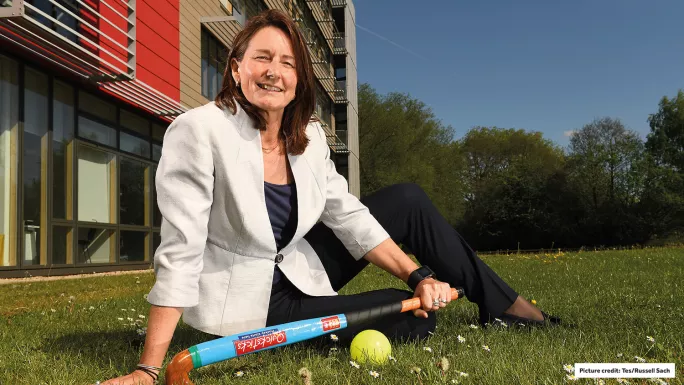- Home
- TES talks to...Alison Oliver
TES talks to...Alison Oliver

Physical education (PE) in UK schools is at a crossroads. Some schools are trimming the amount of time they allocate to PE. Others are outsourcing the coaching of kids to external providers. Experts fear that if we carry on down the current trajectory, by 2035 there is a danger that we will create a generation of “sidelined” children who suffer from poor physical, social and emotional wellbeing.
This is the worst-case scenario vision of the future that was drawn up by the Future Foundation in 2015. The best-case scenario the foundation envisaged is that, by 2035, we will have created a generation of empowered young people who understand the role that physical activity, PE and sport play in their wellbeing and in enhancing their future employability and life chances. In this vision of the future, PE is seen as an essential ingredient in a school’s success.
At a crossroads
One person who is on a mission to ensure that we take the right path at the current crossroads is Alison Oliver, chief executive of the Youth Sport Trust (YST), which commissioned the Future Foundation report. The charity’s aim is to build a brighter future for young people through sport, and Oliver thinks this is possible if we make the right decisions now.
Oliver knows full well the benefits that sport can bring to the wellbeing of young people, having started her career as a PE teacher in Essex before eventually going on to become deputy director of sport at the University of Bath. When there, she was in charge of academic programmes, including the PGCE physical education programme, and she also worked on the English Institute of Sport project. In 2004, she joined the YST as implementation director and, after working her way up through the ranks, took charge of the charity 18 months ago.
Her experience in teaching, coupled with her work at the charity - which involves speaking to PE teachers and headteachers on a regular basis - gives her a good insight into the current state of PE in schools. It’s an insight that gives her cause for concern because she has witnessed how the subject has slowly slipped down the pecking order, with some schools starting to cut back on the amount of time they allocate to it in the curriculum. Now is the time to decide what we want from PE, she says.
“On the one hand, PE could become all about sport and about participation in sport and therefore a ‘nice to do’ thing, which often is focused on the few and not on the many,” she says. “Or it can stick with its historical tradition of being about education through sport and therefore something for every young person and something that is a valuable part of the education and development of a young person.”

She reveals that current attitudes vary wildly across the primary and secondary school sectors. “At the moment in primary schools we have still got good government investment through the primary schools sport premium, which is fantastic,” says Oliver. “[Primary school] headteachers are interested because they’ve got funding, and it’s a policy so Ofsted has a responsibility for looking at it. So we’re working really hard to make sure that these schools don’t just use the money to replace teachers with coaches, and we don’t replace PE with sport and we don’t just service the few, we service the many.”
Under increasing pressure
The bigger challenge that Oliver says she faces is in secondary schools, where there is no ring-fenced funding for PE and where school budgets are coming under increasing pressure.
“For secondary headteachers it’s a tough decision at the moment and we are starting to see a decline in the amount of PE on the timetable. That time gets eaten away for more top-up revision, more maths and English and the core subjects, but at the same time secondary school headteachers are telling us the biggest barriers to pupils’ achievement is their physical, social and emotional wellbeing, because if children are unwell they don’t learn so well. It doesn’t matter how much stuff you pour into them - if a child is emotionally unwell they’re like a bucket full of holes and the more you shove in it just pours out the bottom. That’s the thrust of where we are at at the moment.”
Oliver believes that far too many people - within and outside schools - fail to understand that PE isn’t just about teaching people sport skills and how to play sport, it’s about helping them to develop life skills such as resilience, empathy and teamwork, which, in turn, improve children’s physical and emotional wellbeing.
“If we can influence enough school leaders and school governing bodies to understand that they can reposition PE a bit and make it relevant, then I think it will be safe in the curriculum for a very long time to come,” she says. “However, if secondary schools start to say, ‘We don’t need to give PE curriculum time because they can do that in after-school sport,’ or if, at primary, a school decides with its primary premium to bring in some coaches so that they can get teachers to do more numeracy and literacy, I think we will start to see it slip away because it will be more about the few and it will be less about education and less a core part of a school’s brief.”
Bad personal experiences
The frustrating thing for Oliver is that she thinks many headteachers do understand the value of PE but feel restricted in backing it, and when she encounters those who don’t appreciate PE she says it’s usually not a difficult argument to win. However, bad personal experiences of PE can have an impact on school policy, she believes. “If there is a headteacher who didn’t have a positive experience of sport, and there are lots of people whose PE experience wasn’t good - they were not picked for the teams, they were humiliated in ill-fitting PE equipment, or they were sent out on cross-country runs, which hurt - then we have got to win the hearts and minds. We have to convince them that if [PE] is done badly then it’s probably not the best use of time, so how can we make sure that we do it well and help the teachers of today make sure PE is fit for purpose?”
The charity is currently working on a wide range of different initiatives and projects to educate headteachers about the benefits of PE. For example, last week was National School Sports Week, during which the trust offered support and resources to help schools celebrate the upsides associated with PE.
Oliver also wants PE teachers themselves to help change perceptions. “Let’s face it, there are still schools where we haven’t got the PE department in the 21st century,” she says.
“They still might be doing cross-country lessons and still teaching the correct grip on the javelin at Year 10, and if that’s the case, and kids bunk off, then I absolutely understand why as a headteacher you would say, ‘Why am I wasting two hours for children not to enjoy it, not to get anything out of it, or, worse still, for the kids to not be in school?’, so you have to make it good to make it deliver.”
As well as addressing long-standing cultural issues such as this, the charity is looking to strengthen the “domestic evidence base” to underline for headteachers the tangible benefits that PE delivers.
Young ‘don’t see the benefits’
But it’s not only headteachers and school governors who need convincing of the benefits of PE. Many young people don’t view it as important - a fact that was borne out in a recent survey undertaken for the trust. “We asked a group of young people to rank, in order, a series of things they felt they got from PE and sport,” says Oliver. “Top of the list was physical fitness and then it went down and had things like teamwork, and right at the bottom of the list was getting good grades. We then asked the same group of young people to rank the same list of things according to what was going to be important in terms of getting on in life.
“Getting good grades was at the top, the stuff in the middle was still the same and then right at the bottom of the list was physical fitness. So, simply put, we have a generation of young people that doesn’t think that being fit and healthy has anything to do with being successful and happy in later life. And they certainly don’t think that taking part in PE and sport has anything to do with getting good grades.”
Based on these findings, Oliver says that it is clear that young people have been affected by the current education system where “grades are king” and the importance of PE has been significantly downgraded, but despite drawing this depressing conclusion, she is hopeful that headteachers will take the right path at the current PE crossroads.
“I think that we have to,” says Oliver. “I know PE and sport aren’t the sole answer, but they can be part of the solution. We have got a great sporting system in the UK. We’ve got fantastic sports club structures that other countries would look at with envy, we have got an estate of facilities and we have got PE in the curriculum, so for all of those reasons, I am hopeful. We have reached a tipping point, but I can’t see any logic in why it would tip the other way.”
Simon Creasey is a freelance journalist
Keep reading for just £1 per month
You've reached your limit of free articles this month. Subscribe for £1 per month for three months and get:
- Unlimited access to all Tes magazine content
- Exclusive subscriber-only stories
- Award-winning email newsletters



